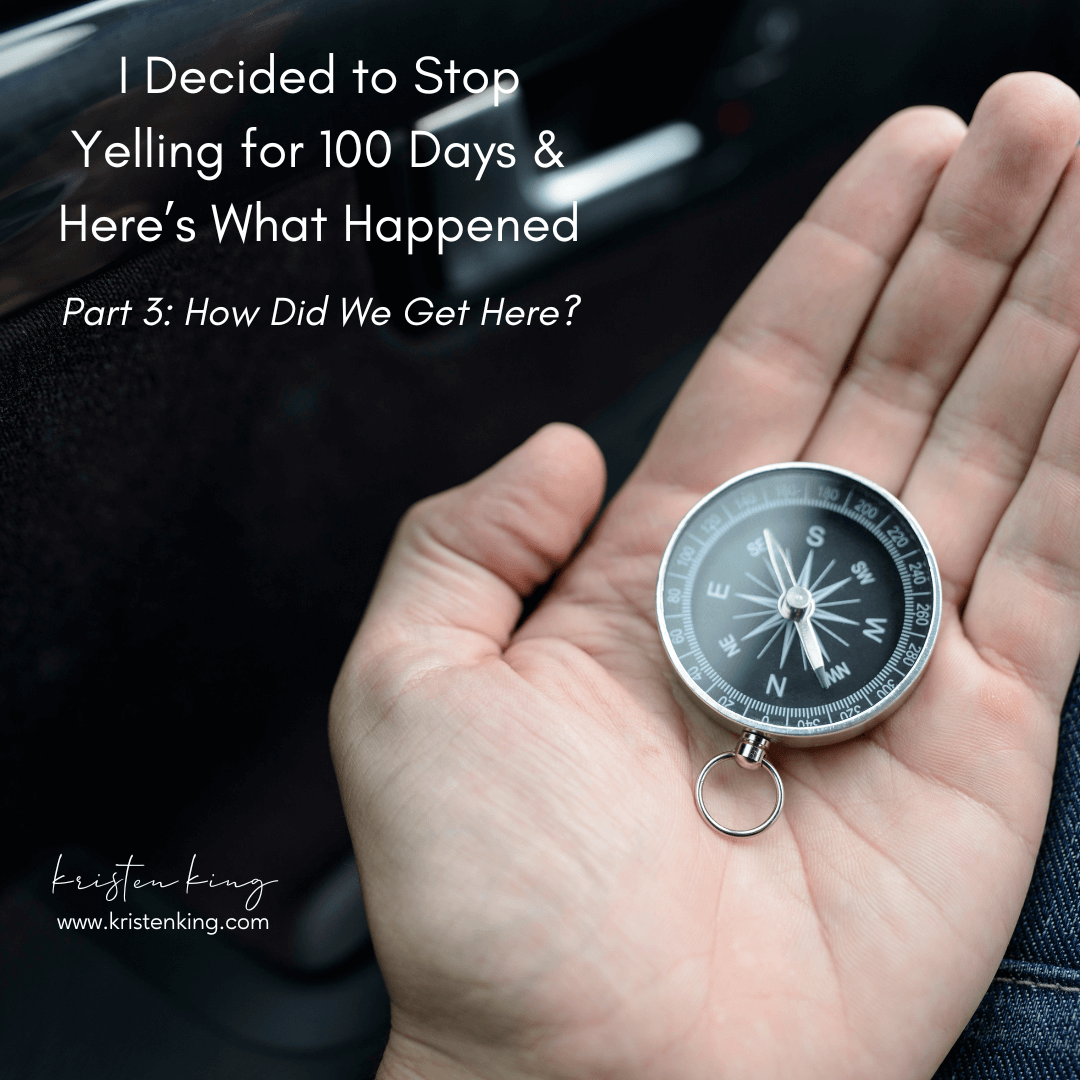This is the third post in a series about why and how I gave up yelling at my kids — for good. Read Part 1: The Meltdown and Part 2: The Plan.
Here’s what’s really wild about this whole yelling thing: I’m actually a really good mom. By all accounts, I’m a great mom. Even when I was yelling, my kids would have told you I was a great mom, the best in the world. I’ve taught parenting classes. I’m a go-to person for advice for overwhelmed or frustrated parents. I mentor vulnerable and at risk families. I volunteer for organizations that support parents, children, and families. I’m a fricking pillar of the community. Any community. You name it: If I’m in it I’m a goddam pillar. And know what? It didn’t matter. It doesn’t matter how great a parent or person you are — you’re not immune from screwing up and you’re certainly not immune from getting completely lost.
As I questioned my very existence through I Decided to Stop Yelling for 100 Days & Here’s What Happened — Part 1: The Meltdown, I learned a lot about how truly good people end up doing things that make them hate themselves. I’ve learned a lot about what leads us to find ourselves in situations we never imagined. I’ve learned a lot about how we lose touch with the face we see in the mirror. I’ve learned a lot about self-compassion and forgiveness. I’ve learned a lot about humility. And I’ve used what I’ve learned to stay yell-free for 172 days as of this writing.
Here’s how I found myself, a great mom, yelling constantly and eroding my children’s self-esteem and sense of unconditional love. These are the choices that made me vulnerable to yelling and breaking my children down instead of building them up.
I Lost My Primary Support Network (and didn’t replace it)
In May 2017, my husband and I followed our dreams and moved to Colorado. Flashback: We had wanted to make the move since 2007, but we used the “life happened” excuse and it never materialized. Shocking. Then, after a series of emotionally devastating miscarriages, I became pregnant with our twins and experienced nearly a full year of medical disability from hyperemesis, pre-ecclampsia, and other pregnancy-related issues (some of which continue today, 6 years later).
This all resulted in a bankruptcy, a foreclosure, and a move to Florida to be closer to my amazing mother-in-law so she could help us financially (we rented a home she owned) and with the kids (she was our main babysitter). The four and a half years we lived in Florida, that woman was my rock and one of my best friends. I still don’t know how I got so lucky as to win the mother-in-law lottery, but I sure did with this lady. She’s incredible — and when we moved to Colorado in May, we left her behind. I also left the only mom-friends I had in real life.
I didn’t realize how much my in-person support system kept me centered and in check. When I was about to lose it with the kids, I could call my MIL and she would be there for me emotionally and/or give me a literal break from the kiddos. My friends would meet me at the playground or one of our houses and let the kids burn off some energy while I blew off some steam. When we moved, I completely lost that in-person support — and the time difference combined with the stress and demands of setting up house in a new place made it difficult to access long-distance support at a reasonable hour. I was adrift for several months, and in those months, my frustration and fears took center stage.
I Stopped Asking for Help
When we moved, I made a decision somewhere along the way that it was up to me to make things work. So if something needed doing, I would do it. If something needed handling, I would handle it. I’d do it myself. I’d do unpacking. I’d do cleaning. I’d do working. I’d do MBA program. I’d do kids. I’d do it all! I’d control the world! No problem! But actually, big problem. It’s one thing to be self-reliant and have confidence that you can take care of business. That’s pretty great. It’s completely another thing to isolate yourself from any source of outside support or assistance and put the weight of the world on your own shoulders. That’s pretty awful.
Not only did I stop asking for help, but I got offended when people offered it. Like, what, you think I can’t handle things? I’ll show you! Back off. I got this. (Except I didn’t. I really didn’t.) My husband bore the brunt of this one. I wouldn’t ask him for help. And I wouldn’t let him help. But I was mad at him for not helping. Same with the kids. If you looked up “martyr” on Wikipedia, my picture would have been there.
I Stopped Taking Care of Myself
Moving cross-country with two little kids while working full time (I work remotely, so I kept my same job and jumped right back in) is NO JOKE. I felt like I couldn’t keep up with all of it. Because “keeping up with all of it” was a literal impossibility, but I couldn’t see that. To feel like I was staying on top of things, I cut out the nonessentials. You know, things like sleep, meals, time alone, that kind of stuff. I stayed up way too late, didn’t eat while trying to power through whatever it was I was doing at a frantic pace, and I sacrificed precious me-time to tackle day-to-day tasks instead of recharging. I ended up completely depleted and running on empty. There was very little fun in my life. I had moments of joy, don’t get me wrong, but that was not my default mode. My stress was through the roof because I wasn’t doing anything to manage it — amid an ENORMOUS life transition. Big mistake. So it’s no surprise that every little thing set me off. I was one lost sneaker or bathtub overflow from a complete meltdown at all times.
I Ignored the Little Things
When annoyances, inconveniences, and frustrations occurred, I clenched my jaw and just dealt with it. I told myself that I was “picking my battles” and “rising above” and not “sweating the small stuff.” What I was actually doing was twofold:
- I was missing the opportunity to head off larger problems by nipping them in the bud.
- I was building a pressure cooker of frustration and resentment — at work, at home, with my family, with my friends, everywhere.
If I had been truly letting things go and focusing on the big issues, that would have been great and healthy. What I was doing instead was just swallowing my feelings and allowing things to accumulate. Not good.
I Believed This Was Just “How It Is Now”
What with all my jaw clenching and teeth gritting and get-it-done-ing, I just put my head down and persevered. All I could see was the endless list of tasks ahead of me: Long nights and even longer days of just falling farther and farther behind. I loved and still love where we moved to, and I saw myself wasting it as I fell farther and farther behind on my to-dos and let my family down in myriad and sundry ways I hadn’t even conceived of yet. And the only way out I could see was actually no way out, and just keep doing it and work hard and maybe when the kids are up and out I can get a break and between now and then how much sleep does a person really need? I’ll make it work. Because this is how it is now. I couldn’t see another way. I felt powerless to change things. So I made do.
I Said Yes Too Much
You’d think with all that doing-everything-myself I would have been saying no to everything. But I was doing the opposite. More responsibility at work? Lay it on me. Home improvement project on the new house? Let’s do this. Volunteer for such-and-such? You got it! Plans every night? SIGN ME UP. Overnight houseguests when I can barely handle the people who actually live here? THAT SOUNDS LIKE A GREAT IDEA.
One of those inappropriate yeses created the situation that led directly to The Meltdown. My husband is a serious endurance athlete, and I said yes to back-to-back 50 miles races over a weekend. This meant two consecutive days of “crewing,” or being his support team, along the race course with two small kids, relentless sunshine alternating with random rainbursts, and about 75 lbs of gear for me, him, and them — which I had to move four times each day to various remote locations that required me to carry all the supplies and wrangle the kids for long distances to and from the car. Was it fun? Parts of it. Was it completely exhausting? Yup. The end of the second day was when I completely lost my shit. That weekend, that yes, was the straw that broke the camel’s back.
How We Got Here: A Summary
- Losing My Support Network
- Not Asking for Help
- Sacrificing Self-Care
- Ignoring the Little Things
- Believing There Was No Other Way
- Saying Yes to Everyone but Myself
The details of your list might look a little different from mine. But if you’re struggling like I was, I bet the headings look pretty similar. These actions and circumstances, these are the things that make us vulnerable. They make us vulnerable to powerlessness, to depression, to anxiety, to physical health problems. And, they make us vulnerable to yelling.
Posts in the No-Yelling Series
I Decided to Stop Yelling for 100 Days & Here’s What Happened
This is a series of posts chronicling what happened when I stopped yelling at my 5-year-old twins — or anyone else, for that matter — for 100 consecutive days. Each article in the series will be updated with additional links as I add more posts.
- Part 1: The Meltdown
- Part 2: The Plan
- Part 3: How Did We Get Here? (current article)







Kirsten – you have my undying respect. What an achievement! So sad, though, that you no longer have your mother-in-law on hand!
Thank goodness she is just a phone call away! <3
Good to hear.
Hello. My son is 5. I write @jeyasmusings.wordpresd.com.
I did a similar thing to my son yesterday. Multiple attempts of hitting because he hit me. I am feeling the way you feel. I am starting this 100 day no yelling just for both our nervous system to feel better. I toucher my heart and his heart thr moment after I hit, he hit too, both in tears both in fastest heartbeats. I am an adult 27 years apart but the same feeling, emotion and body showing it. How is this?
I decide today this is never going to happen in my household no matter what. I am going to look at me in the mirror a little more everyday and look at my son straight into his eyes a little more everyday.
Thank you!